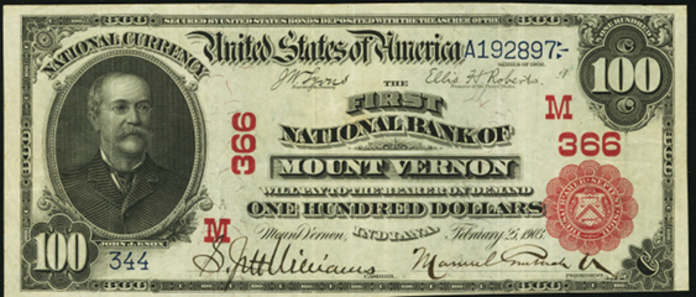One Hundred Dollar Notes › Nationals › 1902 One Hundred Dollar National Bank Notes › Colorado Charters › 1902 $100 Grand Junction Colorado First National Bank
Get Value Now
| Item | Info |
|---|---|
| Series | 1902 |
| Charter | #3860 First National Bank of Grand Junction, Colorado |
| Year Chartered | 1888, 122 Banks Chartered |
| City Info | The city of Grand Junction is the home rule municipality that is the county seat and the most populous municipality of Mesa County, Colorado, United States. The city has a council–manager form of government, and is the most populous municipality in all of western Colorado. Grand Junction is situated 247 miles west-southwest of the Colorado State Capitol in Denver. As of the 2010 census, the population of the city was 58,566. Grand Junction is the 15th most populous city in the state of Colorado and the most populous city on the Colorado Western Slope. Grand Junction serves as a major commercial and transportation hub within the large area between the Green River and the Continental Divide. It is the principal city of the Grand Junction Metropolitan Statistical Area which had a population of 146,723 in 2010 census. Source: Wikipedia |
| Similar Cities | If your note doesn't match try: 1. Grand Junction, Colorado - Grand Valley National Bank 2. Grand Junction, Colorado - Mesa County National Bank |
| Seal Varieties | Red, Blue |
| Other Info | 1. Value depends on notes known for charter, condition and market demand. |
| Neat Fact | Red Seals issued in sheets of 2 Notes: 1 $50 Note & $ $100 Note (Friedbergs, 20th Ed. P135) |
No Obligations Offers and Appraisals
Please submit a good photo or scan. It will be identified and evaluated. Understand there may be subtle differences between the image you see above and your note. Signatures, design, markings and note condition will determine the offer price. Notes in Uncirculated or better condition receive the best offers.
Appraisals can be estimated for wholesale and retail prices. Wholesale is what dealers typically pay. Retail is what a collector might pay. Retail is slightly higher in most cases.
Please visit this page for USA Paper Money Reference. Do not treat this page as a reference guide, it is for appraisal and acquisition purposes only.
